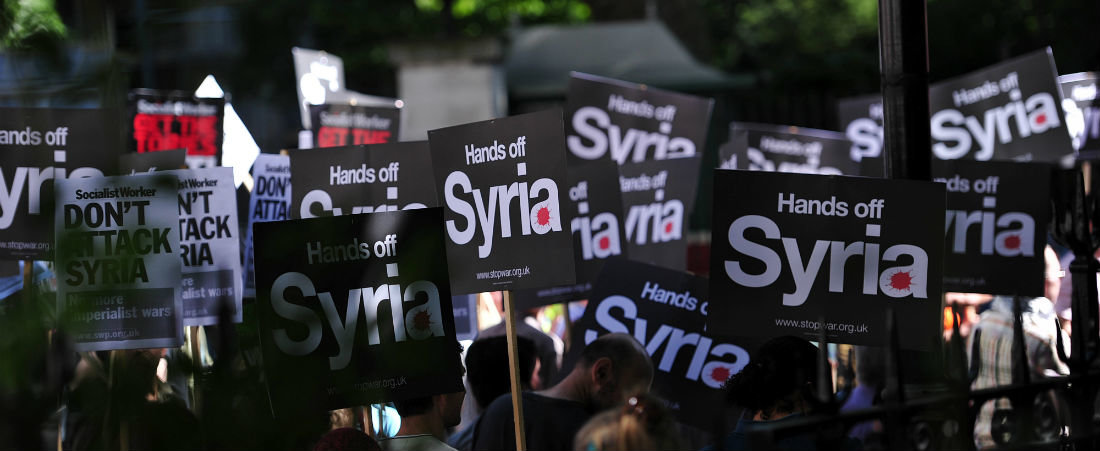Achieved
- Successful intervention in Libya
- Commitment on an EU referendum in 2017
- Sustaining 0.7% aid budget
- Agreement with Iran over nuclear development
- Agreement with Syria over the removal of chemical weapons
More to do
- Pushing for more commercial diplomacy
- Cross border cooperation on tax avoidance
- Longer term nuclear agreement required with Iran
Stalled/dropped
- Failure to get Parliamentary support to intervene in Syria
- 0.7% aid budget dropped from the Queen Speech
The unexpected
- The election of a liberal reformist and the potential of a nuclear Iran
- Tensions with Argentina over the Falklands
Dangers
- Syria
- Iran
- EU referendum
- Afghanistan withdrawal leading to further instability
The Coalition’s foreign policy has had to adjust to the Arab Spring and the uncertain period it ushered in. This adjustment has been most stark in Syria, which has generated major geo-political debate since the first uprising against Assad in 2011. Continuing danger in the region, including the use of chemical weapons and the recent suspicious death of British doctor Abbas Khan, points the way to further difficulties.
With the Government’s successful intervention in Libya and the EU Foreign Minister lifting the arms embargo against Syria, there was speculation that the UK could be dragged into a fresh military conflict, in which the supply of arms to the Assad opposition was merely a first step. However, this proved a step too far for the British Parliament, which refused to support further action. The complexity of the situation on the ground in Syria made the case for intervention one that was far from clear-cut, with the Coalition concerned about certain factions of the opposition fighters, their motives elsewhere, and ambitions.
Following the appointment of the reformist President Dr Haasan Rouhani in Iran, the UK helped achieve significant progress on the nuclear issue, with the landmark agreement made in November 2013 whereby Iran agreed to curb some of its nuclear activities for six months in return for some sanctions relief. While this was a significant step it is only a short term agreement and securing long term peace and security in the region looks set to remain high on the agenda.
All of this traditional deployment of force and diplomacy, however, has not been the limit of the Government’s foreign policy objectives. The Coalition has pursued two other agendas abroad, meeting with success and controversy in each case.
The pledge to keep up a level of spending on foreign aid amounting to 0.7% of GDP – controversial with many on the Conservative backbenches – has been maintained although not enshrined in statute as suggested by the Coalition agreement. Addressing some of the disquiet about where the money goes, the Government has undertaken a full review of UK aid policy, which has resulted in aid being stopped to 16 countries.
With the Government’s growth agenda remaining front and centre, the focus on using foreign policy to promote trade and attract inward investment has continued.
The Government has significantly expanded the UK’s diplomatic corps, with an emphasis on emerging markets, as well as a focus on the special relationship with India, and strengthening ties with China. However the intermingling of economic and diplomatic goals has not been without its issues, with Cameron’s trips to the Middle East and India coming in for criticism.
The Government does claim successes in this new model for foreign policy: the Prime Minister’s recent visit to China secured £6bn in trade deals, and the Chancellor’s preceding visit resulted in London being established as first centre for trading Chinese currency outside of China. In addition the Government have claimed victories with a £4.4bn Airbus contract with the Philippines and for securing a new deal for a Jaguar Land Rover plant in Liverpool.
One issue that could never quite be put to bed is the EU. David Cameron had previously warned his Party not to be “banging on about Europe” while voters concerned themselves with other issues, but the rise of UKIP forced his hand and he has promised that the electorate will “have their say” on Europe in 2017, following negotiations about repatriating powers. This issue will be an on-going point of tension in the Party, especially with the likelihood that UKIP will make major gains in the upcoming European election. Already, cracks are showing – 116 Conservative MPs voted against the Queen’s Speech, backing an amendment expressing regret that a referendum bill was not included as part of the Coalition’s programme. The Prime Minister will hope Europe does not become a defining issue at the next general election.






